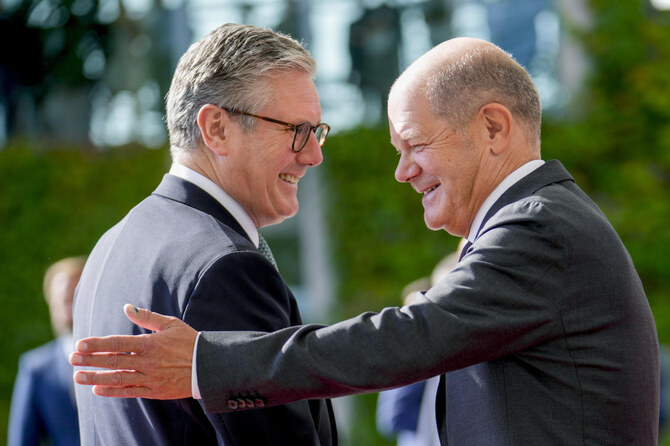BERLIN: Britain and Germany’s leaders agreed in Berlin on Wednesday to work on an ambitious treaty covering issues from defense to trade that would be part of a reset of British relations with the European Union.
Prime Minister Keir Starmer’s trip to the EU’s top powers, Germany and France, aims to help Britain move beyond the previous Conservative government’s fractious relations with European allies. Starmer, who took office last month, has put improved ties at the heart of his efforts to boost Britain’s economic growth.
He billed the new cooperation treaty as a “once-in-a-generation chance to deliver for working people in Britain and in Germany” as it would deepen collaboration in science, technology, business and culture while increasing trade.
Starmer said that growth was his government’s “number one mission.”
“And what we understand clearly is that building relationships with our partners here in Germany and across Europe is vital to achieving it,” he said.
Starmer, addressing a press conference alongside German Chancellor Olaf Scholz, said a reset would not mean reversing Britain’s 2020 exit from the EU under the Conservatives, or re-entering the bloc’s single market or customs union.
“But it does mean a closer relationship on a number of fronts, including the economy, including defense, including exchanges,” he said.
Scholz said Germany wanted to take this outstretched hand.
“The United Kingdom has always been an indispensable part of solving the big issues that affect the whole of Europe,” he said. “This has not changed since it left the EU.”
In a joint declaration, Britain and Germany said they hoped to sign the cooperation treaty at government consultations “by early next year.” Defense ministers were also working on a new defense agreement, they said, which would follow the signing of a joint defense declaration in July.
Stephen Hunsaker, a trade researcher at the UK in a Changing Europe think tank, said however that any efforts to properly improve trade would risk encroaching on EU rules and could only happen at the periphery.
TRUMP FACTOR
Britain and Germany, NATO allies and western Europe’s biggest defense spenders, are looking for ways to deepen defense cooperation ahead of a possible scaling back of US military support for Ukraine if former US President Donald Trump returns to the White House in January.
The Republican presidential candidate has warned that if elected, he would fundamentally rethink “NATO’s purpose and NATO’s mission.” He has also not committed to sending further aid to Ukraine and said he would not defend allies that do not increase their defense budgets. Trump is locked in a tight race with Vice President Kamala Harris in the Nov. 5 election.
Concerns that the US could curb support for Ukraine have increased since Trump picked JD Vance as his running mate. Vance has stressed his opposition to the US writing “blank checks” to help Ukraine fight Russia.
An Anglo-German defense partnership could resemble the Lancaster House pact between Britain and France agreed in 2010, according to officials, with pledges to create a joint force and share equipment and nuclear missile research centers.
Starmer also said the two countries would deepen cooperation on shared social challenges like people smugglers, agreeing to develop a joint action plan to tackle illegal migration.
Starmer will head to Paris for the Paralympics opening ceremony on Wednesday night and meet on Thursday with executives from companies including Thales, Eutelsat, Mistral AI and Sanofi. He will also have talks with President Emmanuel Macron.
























